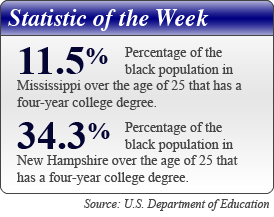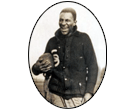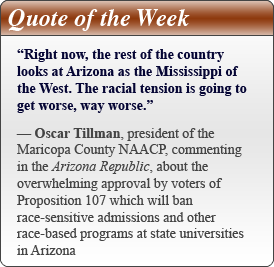Five of the Nation’s 30 Highest-Ranked Universities Have Freshman Classes That Are at Least 10 Percent Black
Once more, this year The Journal of Blacks in Higher Education has completed its survey of black freshman students at the nation’s highest-ranked research universities. For the fourth year in a row, Columbia has the highest percentage of black freshman students among the 30 highest-ranking universities in the nation. There are 202 black freshmen at Columbia this fall. They make up 14.5 percent of the incoming class.

Going back to 2004, the percentage of blacks in the freshman class at Columbia has increased from 6.8 percent to 14.5 percent. The number of black freshmen has more than doubled since 2004. The Columbia freshman class is a record for the JBHE survey. Until now, not one of the 30 highest-ranked universities has ever had a freshman class that was more than 14 percent black in the 18-year history of the JBHE survey.
Second on the JBHE list is Vanderbilt University. Blacks make up 11.2 percent of the incoming class. At Stanford the 186 black students are 11.1 percent of all freshmen. Duke University and the University of North Carolina at Chapel Hill had first-year classes that were at least 10 percent black. This is only the second time in the 18-year history of the JBHE survey where five of the top 30 research universities had freshman classes that are at least 10 percent black.
For a complete listing of this year’s results, click here.

UNIVERSITY OF NORTH CAROLINA ASHEVILLE

Assistant Professor, Digital Design/3D Animation
The Multimedia Arts and Sciences Program at UNC Asheville invites applications for a tenure-track Assistant Professor position in animation and digital media commencing Fall 2011. Applicants will have a significant background in professional animation production as well as university-level teaching experience. Qualified candidates will have a MFA or a PhD degree. A strong portfolio and related industry experience is required. Requisite skills and knowledge include traditional animation, 3D computer animation and 3D modeling. The candidate will demonstrate an expert proficiency in traditional animation, 3D character animation, rigging, and other aspects of character technical direction. Expertise in wider aspects of animation is preferred. Qualified candidates will teach a 4/4 course load in animation history, character animation, storyboarding, plot development, non-linear narrative and 3D environment design at the undergraduate level. Experience with game design and development, game engine programs, prototyping and methods, video/audio productions is a plus. Candidates with the following secondary professional, scholarly and creative expertise are especially encouraged to apply: media theory, representation of race and gender in digital media, animation and ethnic histories, identity and narrative in animation arts, digital media and globalization, mentoring diverse young people in digital and animation media.
SEE FULL JOB LISTING @ JBHE EMPLOYMENT ZONE
Application Review will begin November 8, 2010 and will continue until the position is filled. UNC Asheville is an affirmative action and equal opportunity employer.
Please visit http://www.jbhe.com/jobs.html or http://www2.unca.edu/aa/faculty_positions.htm for the complete advertisement including qualifications and application information.

Spelman College Students Win AT&T Big Mobile on Campus Challenge
 AT&T recently awarded scholarships in its Big Mobile on Campus Challenge competition. Students were invited to submit applications developed for mobile communications devices to the company. This year’s grand prize winners are two students from historically black Spelman College in Atlanta. AT&T recently awarded scholarships in its Big Mobile on Campus Challenge competition. Students were invited to submit applications developed for mobile communications devices to the company. This year’s grand prize winners are two students from historically black Spelman College in Atlanta.
Jonecia Keels and Jazmine Miller will split a $10,000 scholarship for their award-winning “HBCU Buddy” application. The program allows customers to access a directory of historically black colleges and universities on their smart phones. Users can access a wide range of information on each school, see a listing of upcoming events on each campus, and take virtual tours of the black college campuses.
The Poor Performance of Black Students at California Community Colleges
 Data from the Community College System of California shows that during the spring 2010 semester there were more than 120,000 black students enrolled at the state’s 115 community colleges. Data from the Community College System of California shows that during the spring 2010 semester there were more than 120,000 black students enrolled at the state’s 115 community colleges.
But a new report from the Institute for Higher Education Leadership & Policy at California State University at Sacramento finds that black students at California community colleges are not making good progress in completing their academic programs.
The study found that only 17 percent of black students entering these colleges had completed a college-level mathematics course within two years. Only 26 percent of entering black students completed a college-level English course within two years. Only 16 percent of entering black students earned 20 college credits within their first year. The study showed that 47 percent of black students were still enrolled a year later and just 8 percent of black students who entered California community colleges had earned an associate’s degree within six years.
The report, entitled Divided We Fall: Improving Completion and Closing Racial Gaps in California’s Community Colleges, can be accessed by clicking here.
University of Michigan Makes Progress in Restoring Racial Diversity
 In November 2006, voters in Michigan overwhelmingly approved Proposal 2, which prohibited the University of Michigan and other state universities from considering race as a positive factor in their admissions decisions. In 2005, the year before the voter referendum in Michigan, there were 443 black freshmen who made up 7.2 percent of the entering class at the University of Michigan. By 2009 there were only 290 black first-year students at the university. In November 2006, voters in Michigan overwhelmingly approved Proposal 2, which prohibited the University of Michigan and other state universities from considering race as a positive factor in their admissions decisions. In 2005, the year before the voter referendum in Michigan, there were 443 black freshmen who made up 7.2 percent of the entering class at the University of Michigan. By 2009 there were only 290 black first-year students at the university.
This year progress has been made. There are 352 African-American freshmen on campus this year. This is an increase of more than 21 percent from a year ago. Blacks make up 5.4 percent of this year’s freshman class.

NATIONAL INSTITUTES OF HEALTH

Director, National Institute of Dental and Craniofacial Research (NIDCR)
The NIH is the center of medical and behavioral research for the Nation ----making essential medical discoveries that improve health and save lives.
The mission of the National Institute of Dental and Craniofacial Research (NIDCR) is to improve and promote oral, dental, and craniofacial health through research, research training, and the dissemination of health information.
Are you an exceptional candidate who can provide leadership to one of the preeminent Institutes for oral, dental, and craniofacial health research in the world? This position offers a unique opportunity to serve as the chief visionary for the Institute, actively engaging others to create a shared vision of the purpose and direction of the organization. The Director, NIDCR, works collaboratively within the Institute and across the NIH to generate and gain commitment for organizational goals and has a keen awareness of how to navigate through the workings of the public sector to effectively promote and reach NIDCR and NIH objectives. The Director optimizes organization performance by developing strategic priorities, setting and communicating clearly defined expectations, and promoting accountability for results. Serving as a role model for the institute, the Director, NIDCR, demonstrates integrity and fairness, adhering in work and behavior to the highest ethical, scientific research, and business practices standards.
We are looking for applicants with a D.D.S., M.D. and/or Ph.D. who have senior-level research experience and knowledge of research programs in one or more scientific areas related to oral, dental, and craniofacial health. Applicants should be known and respected within their profession, both nationally and internationally, as individuals of outstanding scientific competence.
The successful candidate for this position will be appointed at a salary commensurate with experience and accomplishments, and full Federal benefits, including leave, health and life insurance, retirement and savings plan (401K equivalent) will be provided.
If you are ready for an exciting leadership opportunity, please see the detailed vacancy announcement at http://www.jobs.nih.gov(under Executive Jobs). Applications are due by 11:59 p.m., Friday, December 10, 2010.
NIDCR, NIH AND DHHS ARE EQUAL OPPORTUNITY EMPLOYERS

The New President of Oakwood University
 Oakwood University, the historically black educational institution in Huntsville, Alabama, that is affiliated with the Seventh-day Adventist Church, has named Leslie N. Pollard as its 13th president. Dr. Pollard, who will assume his duties at Oakland University at the beginning of the new year, has been serving as vice president for community partnerships and diversity at Loma Linda University/Adventist Health Sciences Center in Los Angeles. Oakwood University, the historically black educational institution in Huntsville, Alabama, that is affiliated with the Seventh-day Adventist Church, has named Leslie N. Pollard as its 13th president. Dr. Pollard, who will assume his duties at Oakland University at the beginning of the new year, has been serving as vice president for community partnerships and diversity at Loma Linda University/Adventist Health Sciences Center in Los Angeles.
Oakwood University, founded in 1896, today has about 1,900 students, almost all of whom are black.
Dr. Pollard is a graduate of Oakwood University. He holds an MBA from La Sierra University, a master of divinity degree from Andrews University, a doctor of ministry degree from the Claremont School of Theology, and a Ph.D. from La Sierra University.
Recent Books That May Be of Interest to African-American Scholars
 The JBHE Weekly Bulletin regularly publishes a list of new books that may be of interest to our readers. Here are the latest selections. The JBHE Weekly Bulletin regularly publishes a list of new books that may be of interest to our readers. Here are the latest selections.
• A Slaveholders’ Union: Slavery, Politics, and the Constitution in the Early American Republic by George William Van Cleve (University of Chicago Press)
• African Americans in Television: Behind the Scenes by Gregory Adamo (Peter Lang Publishing)
• Black Faces in White Places: 10 Game-Changing Strategies to Achieve Success and Find Greatness by Randall Pinkett (ANACOM)
• Democracy Remixed: Black Youth and the Future of American Politics by Cathy J. Cohen (Oxford University Press)
• Digital Diversity: Youth, Equity, and Information Technology edited by E. Dianne Looker and Ted D. Naylor (Wilfrid Laurier University Press)
• Downhome Gospel: African American Spiritual Activism in Wiregrass Country by Jerrilyn McGregory (University Press of Mississippi)
• Fugitive Justice: Runaways, Rescuers and Slavery on Trial by Steven Lubet (Harvard University Press)
• Joe Louis: Hard Times Man by Randy Roberts (Yale University Press)
• Love Brought Me Back: A Journey of Loss and Gain by Natalie Cole with David Ritz (Simon & Schuster)
• Lowcountry Time and Tide: The Fall of the South Carolina Rice Kingdom by James H. Tuten (University of South Carolina Press)
• Multicultural Comics: From “Zap” to “Blue Beetle” edited by Frederick Luis Aldama (University of Texas Press)
• Neo-Segregation Narratives: Jim Crow in Post-Civil Rights American Literature by Brian Norman (University of Georgia Press)
• New Francophone African and Caribbean Theatres by John Conteh-Morgan with Dominic Thomas (Indiana University Press)
• Rooming in the Master’s House: Power and Privilege in the Rise of Black Conservatism by Molefi K. Asante and Ronald E. Hall (Paradigm Publishers)
• Sitting In and Speaking Out: Student Movements in the American South, 1960-1970 by Jeffrey A. Turner (University of Georgia Press)
• The Imperative of Integration by Elizabeth Anderson (Princeton University Press)
• The Indignant Generation: A Narrative History of African-American Writers and Critics, 1934-1960 by Lawrence P. Jackson (Princeton University Press)
• Unequal Desires: Race and Erotic Capital in the Stripping Industry by Siobhan Brooks (State University of New York Press)
• Violence, Visual Culture, and the Black Male Body by Cassandra Jackson (Routledge)

MASSACHUSETTS INSTITUTE OF TECHNOLOGY

Faculty Positions, Department of Electrical Engineering and Computer Science
The Department of Electrical Engineering and Computer Science (EECS) seeks candidates for faculty positions starting in September 2011. Appointment would be at the assistant or untenured associate professor level. In special cases, a senior faculty appointment may be possible. Faculty duties include teaching at the graduate and undergraduate levels, research, and supervision of student research. We will consider candidates with backgrounds and interests in any area of electrical engineering and computer science. Faculty appointments will commence after completion of a doctoral degree.
Candidates must register with the EECS search website at https://eecs-search.eecs.mit.edu, and must submit application materials electronically to this website. Candidate applications should include a description of professional interests and goals in both teaching and research. Each application should include a curriculum vita and the names and addresses of three or more individuals who will provide letters of recommendation. Candidates should request that their letter writers submit recommendation letters directly to MIT on the website above. Please submit complete application by December 15, 2010.
Send all materials not submitted on the website to:
Professor W. Eric L. Grimson
Department Head, Electrical Engineering and Computer Science
Massachusetts Institute of Technology
Room 38-401
77 Massachusetts Avenue
Cambridge, MA 02139
M.I.T. is an equal opportunity/affirmative action employer.


Honors and Awards
 • Douglas L. Jones Sr., a managing engineer for Michelin Tire Corporation, received the Distinguished Service Award from the Wofford College National Alumni Association. In 1969 Jones was the first African American to graduate from Wofford. • Douglas L. Jones Sr., a managing engineer for Michelin Tire Corporation, received the Distinguished Service Award from the Wofford College National Alumni Association. In 1969 Jones was the first African American to graduate from Wofford.
 • Colin Channer, author and Newhouse Visiting Professor of Creative Writing at Wellesley College in Massachusetts, received the Silver Musgrave Medal for his contributions to literature from the Institute of Jamaica. • Colin Channer, author and Newhouse Visiting Professor of Creative Writing at Wellesley College in Massachusetts, received the Silver Musgrave Medal for his contributions to literature from the Institute of Jamaica.
 • Nancy A. Boxhill, Fulton County commissioner, received the Local Community Service Award from Spelman College in Atlanta. She was honored for her commitment to leadership on issues affecting women, children, and the homeless. • Nancy A. Boxhill, Fulton County commissioner, received the Local Community Service Award from Spelman College in Atlanta. She was honored for her commitment to leadership on issues affecting women, children, and the homeless.
 • A new residence hall on the campus of South Dakota State University in Brookings was named in honor of Cleveland Abbott. A 1916 graduate, Abbott was the first African-American varsity athlete at the university. He later served as head football coach and director of athletics at Tuskegee University for 32 years. Abbott died in 1955. • A new residence hall on the campus of South Dakota State University in Brookings was named in honor of Cleveland Abbott. A 1916 graduate, Abbott was the first African-American varsity athlete at the university. He later served as head football coach and director of athletics at Tuskegee University for 32 years. Abbott died in 1955.
|
Library at Purdue University Renamed to Honor a Black Alumnus
 Roland Parrish, who holds bachelor’s and master’s degrees from Purdue University, is contributing $2 million to his alma mater for the renovation of the Management and Economic Library at the university’s Krannert School of Management. In return, the university is naming the library in his honor. The building will be the first major structure on the Purdue campus to be named after an African-American alumnus. Roland Parrish, who holds bachelor’s and master’s degrees from Purdue University, is contributing $2 million to his alma mater for the renovation of the Management and Economic Library at the university’s Krannert School of Management. In return, the university is naming the library in his honor. The building will be the first major structure on the Purdue campus to be named after an African-American alumnus.
Parrish, who came to Purdue on a track scholarship, now owns 25 McDonald’s restaurants in north Texas.

Black Scholar at MIT Looks for New Ways to Fight Malaria
Worldwide, more than 1 million people die each year from malaria. The disease is treatable by drugs such as chloroquine and artemisinin. But increasingly the parasite that causes malaria is becoming resistant to these common treatments.
 Armed with a $1.5 million grant from the National Institutes of Health, Jacquin C. Niles, an assistant professor of biological engineering at the Massachusetts Institute of Technology, is developing new methods for treating the disease. Using genetic engineering, Niles hopes to “turn off” the parasite’s genes that cause it to reproduce and spread throughout the human body. Armed with a $1.5 million grant from the National Institutes of Health, Jacquin C. Niles, an assistant professor of biological engineering at the Massachusetts Institute of Technology, is developing new methods for treating the disease. Using genetic engineering, Niles hopes to “turn off” the parasite’s genes that cause it to reproduce and spread throughout the human body.
Professor Niles holds a bachelor’s degree and a Ph.D. in molecular toxicology from MIT. He also is a graduate of Harvard Medical School.
Foundation Aims to Increase the Number of Black Nurses
 African Americans are 13 percent of the U.S. population but, according to data from the U.S. Department of Labor, African Americans are only 5.4 percent of all the nurses in this country. The Labor Department projects that by 2016 more than 1 million new nursing jobs will be available. African Americans are 13 percent of the U.S. population but, according to data from the U.S. Department of Labor, African Americans are only 5.4 percent of all the nurses in this country. The Labor Department projects that by 2016 more than 1 million new nursing jobs will be available.
One way to increase the number of new nurses is to increase the number of minority students pursuing careers in the field. The Robert Wood Johnson Foundation’s New Careers in Nursing Scholarship Program offers $10,000 scholarships to up to 400 nursing students from minority groups that are underrepresented in nursing. Schools of nursing may apply for between five and 30 scholarships per year for nursing students from underrepresented groups. Two nursing schools at historically black universities are participating in the grant program. They are Norfolk State University in Virginia and Winston-Salem State University in North Carolina. Nursing schools at high-ranking universities such as the University of Virginia, the University of Pennsylvania, and Johns Hopkins University also received grants from the Robert Wood Johnson Foundation.

NORTH CAROLINA STATE UNIVERSITY

Undergraduate Academic Advisor
The College of Management at North Carolina State University is seeking a team-oriented, student-focused individual for the position of Undergraduate Academic Advisor. Successful candidates will have a background in higher education, experience engaging with diverse student populations, and the ability to successfully multitask in a high traffic academic environment. A master’s degree in counseling, psychology, adult education, business or a related field is required.
To qualify, candidates must have strong communication skills: oral, written, and presentation; excellent interpersonal and counseling skills; the ability to effectively juggle large student loads and multiple responsibilities; and experience with student information systems.
Responsibilities include: advising undergraduate students regarding academic requirements (matriculation and graduation), course selection and registration, and other issues related to academic and student success (e.g., internships, international study, student organizations); developing and delivering programs to diverse student populations in order to promote student engagement and success; and participating in College and University student recruitment and advising programs and events, including some evening and weekend events.
CLICK HERE TO APPLY
AA/EOE. In addition, NC State welcomes all persons without regard to sexual orientation.
Apply Here: http://www.apply-for-job.net/c/jobclick.cfm?site=3328&job=7241791

The University of Alabama Honors Its First Black Students

On June 11, 1963, George C. Wallace, governor of Alabama, defiantly stood in the doorway of Foster Auditorium on the campus of the University of Alabama in an attempt to stop the registration of African Americans James Hood and Vivian Malone. But U.S. marshals and the federalized Alabama National Guard ordered Wallace to step down and allow the students to register for classes.

This past week the University of Alabama dedicated the Malone-Hood Plaza on campus just outside the renovated Foster Auditorium. Constructed in the new plaza and dedicated in the same ceremony is the Autherine Lucy Clock Tower. In 1956, Lucy was the first black student at the university. But due to campus violence, Lucy was expelled, supposedly for her own safety.
University of Maryland Adds Seven African-American Faculty
 The University of Maryland at College Park has announced the hiring of 73 new faculty for the 2010-11 academic year. Among the 73 new hires are seven African Americans and 26 other persons of color. The University of Maryland at College Park has announced the hiring of 73 new faculty for the 2010-11 academic year. Among the 73 new hires are seven African Americans and 26 other persons of color.
Among the new hires is Stephen B. Thomas, who was recruited along with his team of faculty researchers from the University of Pittsburgh. Thomas will head the new Maryland Center for Health Equity on the College Park campus.
GOP Election Gains Might Stall Funds for Higher Education
The results of last week’s midterm elections may make it difficult to add to, or even hold on to, the major gains for higher education funding achieved during the 111th Congress. During the 2009-10 session, allocations were made to provide $36 billion in additional funds for the Pell Grant program for low-income students over the next decade. More than $2.5 billion in added funds were allocated to historically black colleges and universities. More than $750 million in appropriations was aimed at boosting retention and graduation rates and $2 billion was made available to community colleges to develop new academic and career training programs.
With GOP control of the House of Representatives, deficit reduction will be a top priority and funds for higher education, particularly funds earmarked for low-income and minority students, may be hard to come by.

MOUNT HOLYOKE COLLEGE

Tenure-Track Position in Applied and Interdisciplinary Mathematics
The Mathematics and Statistics department at Mount Holyoke College invites application for a tenure-track assistant professorship in applied and interdisciplinary mathematics. Excellence in teaching is essential. We are particularly interested in candidates whose research crosses disciplinary lines in ways that complement programs in the sciences, and who are interested in advising undergraduates doing research at the college.
Qualifications include a doctorate (completed or anticipated) a commitment to teaching and scholarship in a liberal arts environment and evidence of classroom effectiveness. Members of the department teach two courses each semester and are active in both research and curriculum development. Please submit all application materials through MathJobs.org. A completed application should include a CV, statement of teaching philosophy, description of research plans, and a statement of interest in Mount Holyoke College. Three letters of recommendation are also required, at least one of which should comment specifically on your teaching. Applications received by December 1, 2010 will receive full consideration.
Mount Holyoke is an undergraduate liberal arts college for women with 2,100 students and 210 faculty. Half the faculty are women; one fourth are persons of color. It is located about 80 miles west of Boston in the Connecticut River valley, and is a member of the Five College Consortium consisting of Amherst, Hampshire, Mount Holyoke, and Smith Colleges and the University of Massachusetts. Mount Holyoke is committed to fostering multicultural diversity and awareness in its faculty, staff, and student body and is an Equal Opportunity Employer. Women and persons of color are especially encouraged to apply.

In Memoriam
Mildred Fay Jefferson (1926-2010)
 Mildred Jefferson, the first African-American woman to graduate from Harvard Medical School, died last month at her home in Cambridge, Massachusetts. She was 84 years old. Mildred Jefferson, the first African-American woman to graduate from Harvard Medical School, died last month at her home in Cambridge, Massachusetts. She was 84 years old.
Dr. Jefferson was a native of Pittsburg, Texas. She was a graduate of Texas College in Tyler and earned a master’s degree at Tufts University. She graduated from Harvard Medical School in 1951.
Dr. Jefferson went on to become a surgeon at Boston University Medical Center and was a professor of surgery at the university. She was an anti-abortion advocate, serving three terms as president of the National Right to Life Committee.
Hermanze E. Fauntleroy Jr. (1932-2010)
Hermanze E. Fauntleroy Jr., an educator and civil rights activist, died late last month after a battle with cancer. He was 78 years old.
In 1966, Fauntleroy was elected to the city council in Petersburg, Virginia. Shortly thereafter, two of his daughters were among the first seven black students to attend a formerly all-white school in the city. During this period, Fauntleroy served as a development officer at historically black Virginia State University. Fauntleroy was elected mayor of Petersburg in 1973, the first black mayor in Virginia since Reconstruction.
Appointments, Promotions, and Resignations
 • Louis “Skip” Perkins was appointed director of athletics at Howard University in Washington, D.C. He was the athletics director at the University of Arkansas at Pine Bluff. Perkins holds a bachelor’s degree and two master’s degrees from North Carolina Central University. • Louis “Skip” Perkins was appointed director of athletics at Howard University in Washington, D.C. He was the athletics director at the University of Arkansas at Pine Bluff. Perkins holds a bachelor’s degree and two master’s degrees from North Carolina Central University.
 • Charles E. Williams was elected chair of the board of trustees at Tuskegee University in Alabama. He replaces Andrew F. Brimmer, former governor of the Federal Reserve Board, who served as board chair for 28 years. • Charles E. Williams was elected chair of the board of trustees at Tuskegee University in Alabama. He replaces Andrew F. Brimmer, former governor of the Federal Reserve Board, who served as board chair for 28 years.
Williams is a retired major general of the U.S. Army. After leaving the military he served as president of the New York City School Construction Authority.
 • Adriel A. Hilton, executive assistant to the president at Upper Iowa University in Fayette, has been named chief diversity officer of the educational institution. • Adriel A. Hilton, executive assistant to the president at Upper Iowa University in Fayette, has been named chief diversity officer of the educational institution.
Dr. Hilton is a graduate of Morehouse College. He holds a master’s degree in applied social science from Florida A&M University and a doctorate in higher education from Morgan State University.
Grants and Gifts
• Winston-Salem State University, the historically black educational institution in North Carolina, received a $952,680 grant from the Rehabilitation Services Administration to develop curriculum to prepare students to work with underrepresented groups who need vocational rehabilitation.
 The grant program is under the direction of Yolanda Edwards, associate professor of rehabilitation counseling at the university. She holds bachelor’s and master’s degrees from South Carolina State University and a Ph.D. from the University of Iowa. The grant program is under the direction of Yolanda Edwards, associate professor of rehabilitation counseling at the university. She holds bachelor’s and master’s degrees from South Carolina State University and a Ph.D. from the University of Iowa.
• Historically black Hampton University in Virginia received a $1,250,000 grant from the U.S. Department of Health and Human Services to establish a family support center for low-income and minority families with developmentally disabled pre-school children.
 The grant program will be under the direction of Bernadette R. Williams, associate professor and chair of the department of physical therapy at Hampton University. A graduate of Tulane University, Dr. Williams holds a master’s degree from the University of Alabama at Birmingham and a doctorate from Rocky Mountain University of Health Professions. The grant program will be under the direction of Bernadette R. Williams, associate professor and chair of the department of physical therapy at Hampton University. A graduate of Tulane University, Dr. Williams holds a master’s degree from the University of Alabama at Birmingham and a doctorate from Rocky Mountain University of Health Professions.
• The University of Virginia received a $1,275,000 grant from the National Institutes of Health for research to determine the low representation of blacks and other minorities in biomedical research.
 Heather Wathington, an assistant professor at the Curry School of Education at the University of Virginia, is co-principal investigator of the project. Dr. Wathington is a 1992 graduate of Wellesley College and holds a master’s degree from the University of Pennsylvania and a doctorate from the University of Michigan. Heather Wathington, an assistant professor at the Curry School of Education at the University of Virginia, is co-principal investigator of the project. Dr. Wathington is a 1992 graduate of Wellesley College and holds a master’s degree from the University of Pennsylvania and a doctorate from the University of Michigan.
• Historically black Alabama A&M University received a $620,000 grant from the U.S. Department of Transportation to improve bus shelters and to build a bus facility on campus.
• Grambling State University, the historically black educational institution in Louisiana, received a $792,502 grant from the National Institutes of Health for a program to prepare university students for doctoral programs in the biomedical sciences.
• Historically black Florida A&M University received an $80,000 grant from the Blue CrossBlue Shield of Florida Foundation for a program to fight childhood obesity in Tallahassee.
• Bowie State University, the historically black educational institution in Maryland, received a $267,000 grant from the National Science Foundation to obtain equipment for the university’s department of natural sciences and to enhance the curriculum in biochemistry.
 The grant will be under the direction of Alan J. Anderson, an assistant professor of chemistry at Bowie State. Dr. Anderson is a graduate of North Carolina A&T State University and holds a Ph.D. in organic chemistry from Howard University. The grant will be under the direction of Alan J. Anderson, an assistant professor of chemistry at Bowie State. Dr. Anderson is a graduate of North Carolina A&T State University and holds a Ph.D. in organic chemistry from Howard University.
|
 .
.